Top Rankings
Yadkin County Schools School District ranks among the top 20% of public school district in North Carolina for:
Category
Attribute
Community Size
Largest student body (number of students) (Top 1%)
For the 2025 school year, there are 6 public high schools serving 2,435 students in Yadkin County Schools School District. This district's average high testing ranking is 3/10, which is in the bottom 50% of public high schools in North Carolina.
Public High Schools in Yadkin County Schools School District have an average math proficiency score of 48% (versus the North Carolina public high school average of 58%), and reading proficiency score of 46% (versus the 58% statewide average).
Public High School in Yadkin County School School District have a Graduation Rate of 82%, which is less than the North Carolina average of 85%.
The school with highest graduation rate is Yadkin Early College, with ≥90% graduation rate. Read more about public school graduation rate statistics in North Carolina or national school graduation rate statistics.
Minority enrollment is 34% of the student body (majority Hispanic), which is less than the North Carolina public high school average of 55% (majority Black and Hispanic).
Overview
This School District
This State (NC)
# Schools
14 Schools
761 Schools
# Students
5,176 Students
565,764 Students
# Teachers
331 Teachers
33,453 Teachers
Student : Teacher Ratio
16:1
16:1
District Rank
Yadkin County Schools School District, which is ranked within the bottom 50% of all 320 school districts in North Carolina (based off of combined math and reading proficiency testing data) for the 2021-2022 school year.
The school district's graduation rate of 87% has decreased from 89% over five school years.
Overall District Rank
#180 out of 325 school districts
(Bottom 50%)
(Bottom 50%)
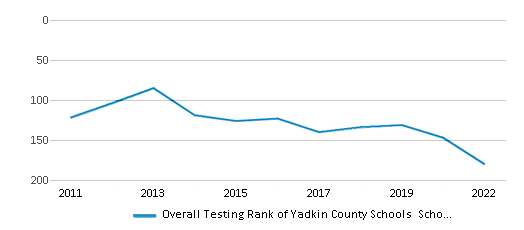
Math Test Scores (% Proficient)
51%
51%
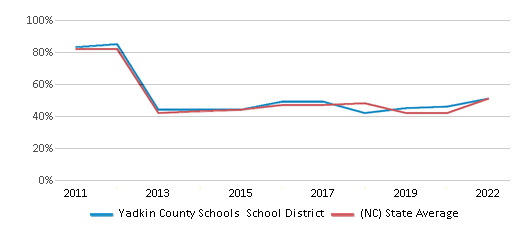
Reading/Language Arts Test Scores (% Proficient)
45%
50%
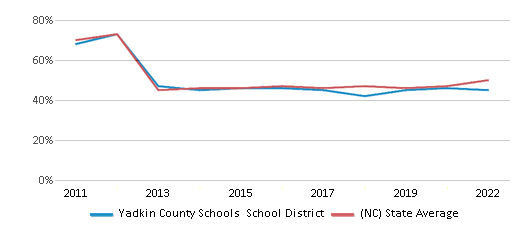
Science Test Scores (% Proficient)
70%
63%
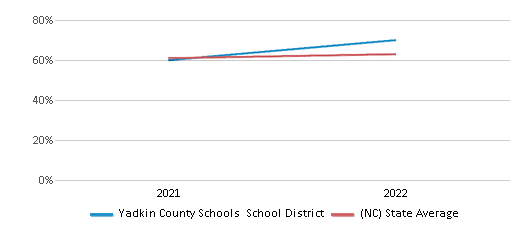
Graduation Rate
87%
86%
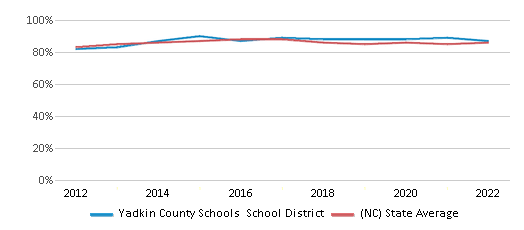
Students by Ethnicity:
Diversity Score
0.49
0.70
# American Indian Students
7 Students
5,772 Students
% American Indian Students
n/a
1%
# Asian Students
17 Students
21,293 Students
% Asian Students
n/a
4%
# Hispanic Students
1,412 Students
115,235 Students
% Hispanic Students
27%
20%
# Black Students
131 Students
138,700 Students
% Black Students
3%
24%
# White Students
3,460 Students
254,801 Students
% White Students
66%
45%
# Hawaiian Students
3 Students
765 Students
% Hawaiian Students
n/a
n/a
# Two or more races Students
196 Students
30,969 Students
% of Two or more races Students
4%
6%
Students by Grade:
# Students in PK Grade:
225
491
# Students in K Grade:
379
6,922
# Students in 1st Grade:
379
6,949
# Students in 2nd Grade:
394
7,207
# Students in 3rd Grade:
371
7,125
# Students in 4th Grade:
361
7,196
# Students in 5th Grade:
372
7,763
# Students in 6th Grade:
360
11,146
# Students in 7th Grade:
379
12,024
# Students in 8th Grade:
378
12,284
# Students in 9th Grade:
433
137,976
# Students in 10th Grade:
393
126,349
# Students in 11th Grade:
403
117,582
# Students in 12th Grade:
349
104,750
# Ungraded Students:
-
-
District Revenue and Spending
The revenue/student of $11,094 in this school district is less than the state median of $11,187. The school district revenue/student has stayed relatively flat over four school years.
The school district's spending/student of $10,996 is less than the state median of $11,612. The school district spending/student has stayed relatively flat over four school years.
Total Revenue
$57 MM
$17,307 MM
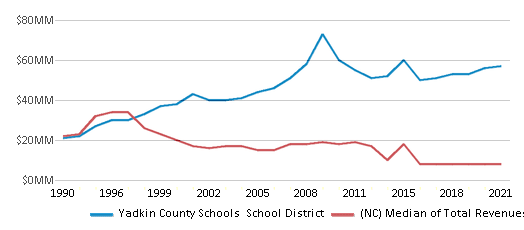
Spending
$57 MM
$17,964 MM
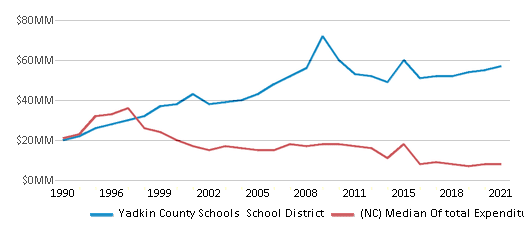
Revenue / Student
$11,094
$11,187
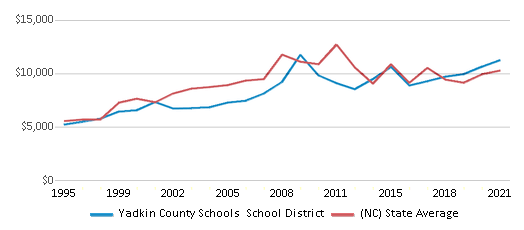
Spending / Student
$10,996
$11,612
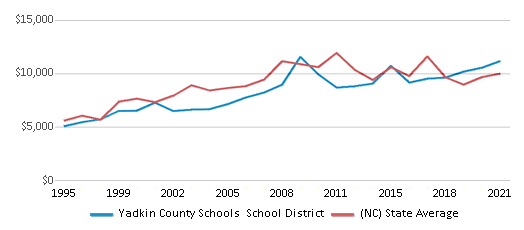
Best Yadkin County Schools School District Public High Schools (2025)
School
(Math and Reading Proficiency)
(Math and Reading Proficiency)
Location
Grades
Students
Rank: #11.
Yadkin Early College
(Math: ≥90% | Reading: ≥90%)
Rank:
Rank:
10/
Top 1%10
1001 College Drive
Yadkinville, NC 27055
(336) 386-3579
Yadkinville, NC 27055
(336) 386-3579
Grades: 9-13
| 166 students
Rank: #22.
Forbush High School
(Math: 75-79% | Reading: 50%)
Rank:
Rank:
8/
Top 30%10
1525 Falcon Road
East Bend, NC 27018
(336) 551-1140
East Bend, NC 27018
(336) 551-1140
Grades: 8-12
| 813 students
Rank: #33.
Boonville Elementary School
(Math: 50-54% | Reading: 50-54%)
Rank:
Rank:
6/
Top 50%10
232 East Main Street
Boonville, NC 27011
(336) 551-1115
Boonville, NC 27011
(336) 551-1115
Grades: PK-12
| 358 students
Rank: #44.
Starmount High School
(Math: 40-49% | Reading: 45-49%)
Rank:
Rank:
5/
Bottom 50%10
2516 Longtown Rd
Boonville, NC 27011
(336) 551-1150
Boonville, NC 27011
(336) 551-1150
Grades: 8-12
| 552 students
Rank: #55.
Starmount Middle School
(Math: 40% | Reading: 39%)
Rank:
Rank:
4/
Bottom 50%10
2626 Longtown Rd
Boonville, NC 27011
(336) 551-1160
Boonville, NC 27011
(336) 551-1160
Grades: 6-9
| 493 students
Rank: #66.
Yadkin Success Academy
Alternative School
(Math: ≤20% | Reading: 21-39%)
Rank:
Rank:
1/
Bottom 50%10
733 East Main Street
Yadkinville, NC 27055
(336) 551-1166
Yadkinville, NC 27055
(336) 551-1166
Grades: K-12
| 53 students
Recent Articles

Year-Round Or Traditional Schedule?
Which is more appropriate for your child? A year-round attendance schedule or traditional schedule? We look at the pros and cons.

Why You Should Encourage Your Child to Join a Sports Team
Participating in team sports has a great many benefits for children, there is no doubt. In this article you will learn what those benefits are.

White Students are Now the Minority in U.S. Public Schools
Increasing birth rates among immigrant families from Asia and Central and South America, combined with lower birth rates among white families, means that for the first time in history, public school students in the United States are majority-minority. This shift in demographics poses difficulties for schools as they work to accommodate children of varying language abilities and socio-economic backgrounds.





